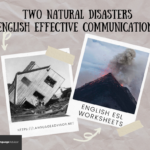Two Animal Attacks – Effective Communication. English ESL Worksheets to improve reading and develop strong language and Speaking skills.
Two Animal Attacks – Effective Communication

Two Animal Attacks – Effective Communication
Procedure
Divide the class into pairs. Give each student a copy of either the A or B reading sheets. The students read the short articles silently by themselves and use a dictionary or consult the teacher if they don’t understand a word or phrase. After the students have read and understood the articles, the teacher takes the articles away. Then student A will communicate what was in A’s article to student B, and student B will communicate what was in B’s article to A. Then all of the students take a test to see how much information they were able to communicate.
| Shark Attacks When people go swimming in the open ocean, they may experience some fear of being attacked by a shark. Although, it is possible that you will be attacked, it is highly unlikely. In fact, chances are that even if you see a shark it will not attack you. It is more likely that you will be struck by lightning. In the coastal states of the U.S., about 180 people are struck by lightning every year, but only about 11 people are attacked by sharks. Of those 11 attacks, chances are that only one of them will be fatal. In fact, you are more likely to drown than to be attacked by a shark. (The chances are about 1 in 3.5 million that you will drown while at the beach, but about 1 in 11 million that you will be attacked by a shark.) However, if you are still worried about shark attacks, there are several ways to reduce the chances of being attacked by a shark. Traveling in groups is one way to reduce the risks. Sharks are much more likely to attack a solitary swimmer. Also, stay out of the water if you have a cut since sharks have a good sense of smell. | Bear Attacks When people go hiking in the back woods of North America, they might experience some fear of being attacked by a bear. Although it is possible that you will be attacked, it is extremely improbable. In fact, chances are that if you run into a bear, the bear will be more afraid of you and go away by itself. It is more likely that you will die in a car crash on your way to the back woods than by being attacked by a bear. In the Yellowstone National Park in the U.S., statistics show that you are more likely to drown than to be attacked by a bear. In the period between 1839 and 1994, 101 people died from drowning but only 5 people were killed by grizzly bears. However, if you are still worried about bear attacks, there are several ways to reduce the chances of being attacked by a bear. Traveling in groups is one way to reduce the chances. Bears are very unlikely to attack groups of four or more people. Also, stay calm if you run into a bear. Bears are much more likely to attack if you try to run away. |
Test to be given after reading and information gap activity:
| The Chances of a Shark Attack What is the title of the article?What do people sometimes fear when they go swimming in the open ocean?What will probably happen if you see a shark while you are swimming?What are you more likely to be struck by?How many people are struck by lightning in the coastal states every year?How many people are attacked by sharks?How many of the shark attacks are fatal?What else are you more likely to die because of?What are the chances of drowning?What are the chances of being attacked by a shark?How can you reduce the chances of a shark attack?(a) (b) | The Chances of a Bear Attack What is the title of the article?What do some people fear when they go hiking in the back woods of North America?What will the bear probably do if you run into it?What are you more likely to die from?What park does the article mention?According to the article, what are you more likely to die from?In the period between 1839 and 1994, how many people died from drowning?How many people died from bear attacks?What are two ways you can reduce the chances of a bear attack?(a) (b) |

All downloads are in PDF format





